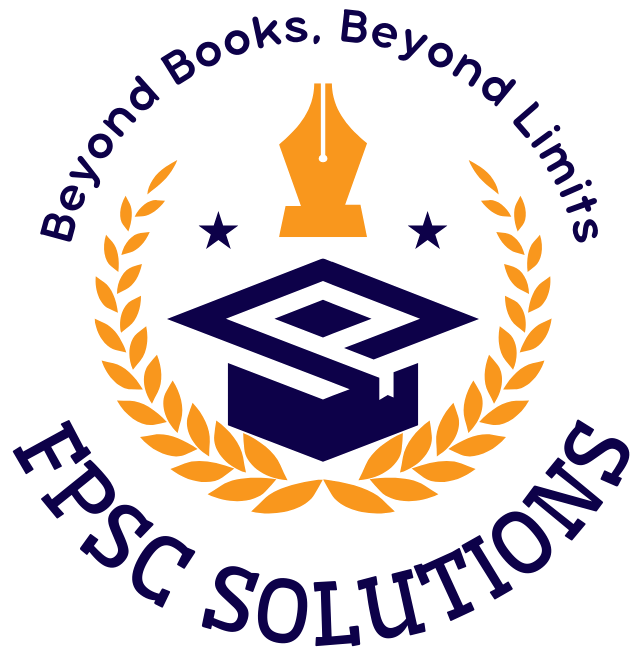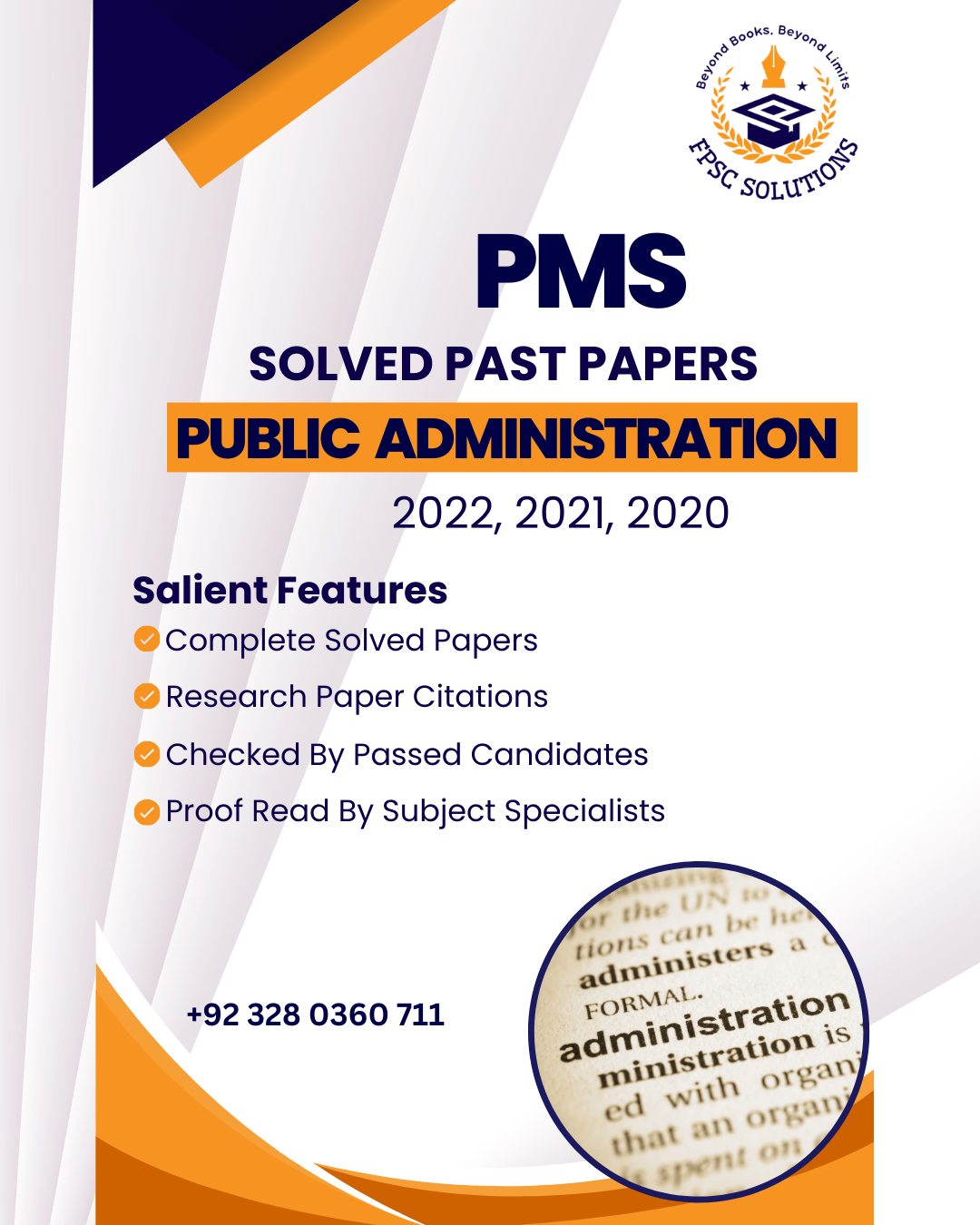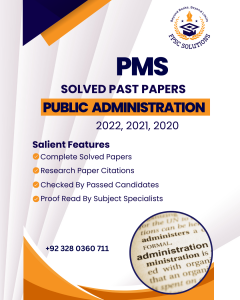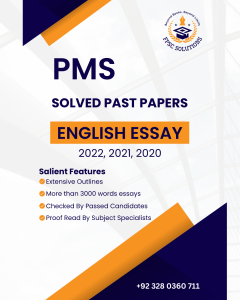The PMS exam in Pakistan is a competitive examination conducted by provincial commissions to recruit government officers for administrative roles. This exam consists of a written test, psychological assessment, and an interview, with successful candidates being appointed as First Class Officers (Grade 17) in the provincial government. PMS public administration papers are important in the PMS exam as they provide a comprehensive understanding of governance and public policy, which is essential for effective public service roles.
PMS Public Administration paper (1 & 2) 2021 solutions are also important because they familiarize candidates with the exam format, enhance their time management skills, and boost confidence by allowing them to practice under real exam conditions. The PMS Past paper solutions and free preparation material improve students’ chances of success. This article will break down the key questions from the 2023 paper and offer guidance on how to tackle each topic effectively.

PMS Public Administration Paper 1 (2021)
Paper 1
Q1. The differences between public administration and business management are profound. Explain how the two fields are alike and how they differ. Why are the two terms not interchangeable?
Q2. Discuss the major elements of the public policy-making cycles. Highlight the interactions within these elements in the context of public policy-making in Pakistan.
Q3. How do public administrators in Pakistan need to tackle “wicked problems” differently? Discuss by illuminating wicked problems.
Q4. Comparatively, evaluate Taylor’s Scientific Management and Weber’s Ideal Bureaucracy, and discuss their relevance to the contemporary public organization.
Q5. Planning is one aspect of the policy process. Discuss the various types of planning and their objectives. What will be the primary concern of the planning group in the planning process?
Q6. What is devolution? Discuss whether the movement toward devolution is a threat or an opportunity for provincial/national governments in a federal system. How does this apply to Pakistan?
Q7. “Is corruption in government any worse than in the private sector, or is it just more visible, discuss if you agree/disagree with this statement in the context of Pakistan.
Q8. The essence of Public Value is the revival of Government as a value-creating to create an institution. Discuss me role of public administrators in the current coronavirus epidemic situation value for citizens.
Paper 2
Q1. The 18th constitutional amendment in the constitution of the Islamic Republic of Pakistan is considered to be a major event in our constitutional history that gave many powers to the provincial governments. How has this change affected the relationship and coordination between federal and provincial governments with particular reference to health, education, and agriculture?
Q2. “Some of the Public Sector issues are considered as “Wicked Problems” and Pakistan’s public sector lacks institutional human resource capacity.” Give your opinions on this statement with examples.
Q3. Since the creation of Pakistan, several attempts have been made to reform the civil service in Pakistan. How do you see these reforms and what major challenges have been identified by various commissions, committees, and/or task forces?
Q4. Describe the system of auditing in Pakistan and how it can help in dealing with the menace of corruption and financial mismanagement in the public sector.
Q5. How critical is it to evaluate a public policy after implementation and what techniques can administrators use in ensuring proper evaluation of a policy?
Q6. What is the role of politics in the budgetary process? Explain several concerns such as representation, consensus, coalition building, and locus of power in allocating funds.
Q7. Corruption has been one of the most enduring problems confronting governments throughout history. What are the corrective ways to foster public corruption? How the traditional public sector values can be reinforced in public servants?
Q8. Devolution, decentralization, autonomy, and establishment of local governments are said to be the ultimate solution to the Issues of governance and service delivery. Give arguments in favor or against this statement.
PMS Public Administration 2021 Solved Paper(1 & 2) with Citation
-
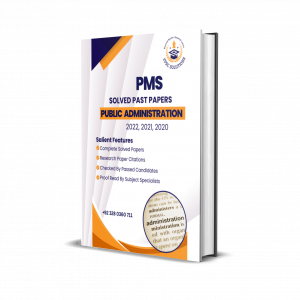
PMS PUBLIC ADMINISTRATION SOLVED PAST PAPERS 2022, 2021, 2020
₨ 999 – ₨ 2,499Select options This product has multiple variants. The options may be chosen on the product page
How to Write the Answers for Each Question of the Paper
paper 1
Q1. The differences between public administration and business management are profound. Explain how the two fields are alike and how they differ. Why are the two terms not interchangeable?
To write an essay on this question, start by explaining the similarities between public administration and business management, such as their focus on organizational efficiency, leadership, and resource management. Then, discuss the key differences, highlighting how public administration is concerned with public interest, accountability, and transparency, while business management focuses on profit maximization and competitiveness. Conclude by explaining why the two terms are not interchangeable due to their different objectives, stakeholders, and operational environments.
Q2. Discuss the major elements of the public policy-making cycles. Highlight the interactions within these elements in the context of public policy-making in Pakistan.
Begin your essay by defining the public policy-making cycle, which typically includes agenda-setting, policy formulation, decision-making, implementation, and evaluation. Discuss each element in detail, providing examples from Pakistan’s context, such as health or education policies. Highlight how these elements interact with each other, influencing the overall effectiveness of public policies in Pakistan.
Q3. How do public administrators in Pakistan need to tackle “wicked problems” differently? Discuss by illuminating wicked problems.
Start by defining “wicked problems,” which are complex issues that lack clear solutions and involve multiple stakeholders. Provide examples of wicked problems in Pakistan, such as corruption or terrorism. Discuss how public administrators need to approach these problems differently, emphasizing the need for innovative, flexible, and collaborative strategies to address such challenges effectively.
Q4. Comparatively, evaluate Taylor’s Scientific Management and Weber’s Ideal Bureaucracy, and discuss their relevance to the contemporary public organization.
This essay starts by explaining Taylor’s Scientific Management, which focuses on efficiency and productivity through standardized tasks and practices, and Weber’s Ideal Bureaucracy, which emphasizes rules, hierarchy, and meritocracy. Compare and contrast these theories, discussing their strengths and weaknesses. Finally, evaluate their relevance to contemporary public organizations, considering current trends like flexibility, innovation, and accountability.
Q5. Planning is one aspect of the policy process. Discuss the various types of planning and their objectives. What will be the primary concern of the planning group in the planning process?
Begin by defining planning in the context of the policy process, and explaining its importance in achieving policy objectives. Discuss various types of planning, such as strategic, operational, and contingency planning, along with their objectives. Highlight the primary concerns of the planning group, such as setting clear goals, allocating resources, and anticipating potential challenges to ensure effective policy implementation.
Q6. What is devolution? Discuss whether the movement toward devolution is a threat or an opportunity for provincial/national governments in a federal system. How does this apply to Pakistan?
Start by defining devolution, which refers to the transfer of powers from central to local governments. Discuss the potential benefits of devolution, such as increased local autonomy, improved service delivery, and enhanced public participation. Also, consider the potential threats, such as coordination challenges and uneven development. Apply these concepts to Pakistan’s federal system, discussing how devolution has impacted governance at the provincial and national levels.
Q7. “Is corruption in government any worse than in the private sector, or is it just more visible, discuss if you agree/disagree with this statement in the context of Pakistan.
To address this question, start by defining corruption and comparing its manifestations in the public and private sectors. Discuss whether corruption in government is inherently worse or simply more visible due to public scrutiny and accountability requirements. Provide examples from Pakistan to support your argument, discussing the impact of corruption on public trust and governance.
Q8. The essence of Public Value is the revival of Government as a value-creating to create an institution. Discuss me role of public administrators in the current coronavirus epidemic situation value for citizens.
Start this essay by defining Public Value and its significance in public administration. Discuss the role of public administrators in creating public value, especially during the COVID-19 pandemic. Highlight the various ways in which public administrators in Pakistan have contributed to managing the crisis, such as ensuring public safety, distributing resources, and maintaining essential services.
paper 2
Q1. The 18th constitutional amendment in the constitution of the Islamic Republic of Pakistan is considered to be a major event in our constitutional history that gave many powers to the provincial governments. How has this change affected the relationship and coordination between federal and provincial governments with particular reference to health, education, and agriculture?
Begin by explaining the 18th constitutional amendment and its significance in Pakistan’s constitutional history. Discuss how the amendment has affected federal-provincial relations, particularly in health, education, and agriculture. Provide examples of changes in governance and coordination challenges that have emerged since the amendment was enacted.
Q2. “Some of the Public Sector issues are considered as “Wicked Problems” and Pakistan’s public sector lacks institutional human resource capacity.” Give your opinions on this statement with examples.
To write this essay, start by explaining the concept of wicked problems and their relevance to the public sector. Discuss the institutional and human resource capacity challenges in Pakistan’s public sector, providing examples of how these issues affect the management of wicked problems like poverty or public health. Offer suggestions for building capacity and improving problem-solving approaches in the public sector.
Q3. Since the creation of Pakistan, several attempts have been made to reform the civil service in Pakistan. How do you see these reforms and what major challenges have been identified by various commissions, committees, and/or task forces?
Begin by outlining the history of civil service reforms in Pakistan, highlighting key initiatives and their objectives. Discuss the major challenges identified by various commissions, committees, and task forces, such as bureaucratic inertia, political interference, and lack of meritocracy. Provide your analysis of these reforms, considering their successes and areas where further improvements are needed.
Q4. Describe the system of auditing in Pakistan and how it can help in dealing with the menace of corruption and financial mismanagement in the public sector.
Start by describing the auditing system in Pakistan, including its structure, functions, and types of audits conducted. Discuss how effective auditing can help prevent and detect corruption and financial mismanagement in the public sector, providing examples of successful audits that have led to accountability and transparency improvements.
Q5. How critical is it to evaluate a public policy after implementation and what techniques can administrators use in ensuring proper evaluation of a policy?
To address this question, explain the importance of evaluating public policies after implementation, emphasizing the need for accountability, learning, and continuous improvement. Discuss various evaluation techniques, such as cost-benefit analysis, performance measurement, and impact assessment, and how they can be used to ensure that policies achieve their intended outcomes.
Q6. What is the role of politics in the budgetary process? Explain several concerns such as representation, consensus, coalition building, and locus of power in allocating funds.
Start by discussing the role of politics in the budgetary process, emphasizing the importance of representation, consensus-building, and coalition formation in fund allocation. Highlight the challenges associated with political decision-making, such as power dynamics, lobbying, and competing interests, and provide examples of how these factors influence budgetary outcomes in Pakistan.
Q7. Corruption has been one of the most enduring problems confronting governments throughout history. What are the corrective ways to foster public corruption? How the traditional public sector values can be reinforced in public servants?
Begin by discussing the impact of corruption on governance and public trust. Outline various corrective measures to address corruption, such as strengthening oversight mechanisms, promoting transparency, and enforcing anti-corruption laws. Discuss how traditional public sector values, like integrity and accountability, can be reinforced through training, ethical leadership, and organizational culture.
Q8. Devolution, decentralization, autonomy, and establishment of local governments are said to be the ultimate solution to the Issues of governance and service delivery. Give arguments in favor or against this statement.
To write this essay, define devolution, decentralization, and autonomy, explaining their potential benefits for governance and service delivery. Present arguments in favor of these concepts, such as improved local governance, responsiveness, and citizen participation. Also, consider potential drawbacks, such as capacity constraints and coordination challenges, providing a balanced analysis of the statement.
In Summary, the PMS Public Administration 2021 Solved Paper is an indispensable resource for students preparing for the PMS exam. By thoroughly studying this solved paper, students can gain valuable insights into the complexities of public administration, enhance their understanding of critical topics, and develop effective strategies for answering exam questions. This paper covers a wide range of subjects, from public policy-making and governance reforms to corruption and public value creation. Utilizing this solved paper can help students strengthen their knowledge, boost their confidence, and achieve success in their civil service careers.
